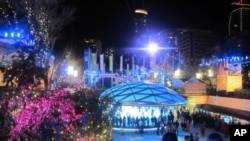The 2010 Winter Olympics call Vancouver, British Columbia, home. The 2010 World Cup takes place across South Africa in July. These events attract hoards of spectators, bringing construction projects, jobs, money for businesses and tax revenues for local governments. Countries compete fiercely to host such events.
But are these premiere sporting events usually a net benefit to the host country?
"If you look at the economics of the large projects they fall into two categories," says Fariborz Ghadar of Pennsylvania State University. "For example in the Olympics, you have the costs of actually running the operation, and then you have the costs of building the infrastructure to house it. Generally, both of them are underestimated."
Ghadar cites this year's winter Olympic games in Vancouver as an example. Originally, city officials estimated the costs of preparing for the games at around $2 billion. However costs have already topped $4.6 billion, and may ultimately top $5 billion or $6 billion, according to Ghadar.
"And on the benefit side, they (host cities) always seem to exaggerate the benefit. In Vancouver they think they're going to make $9 billion, but in reality they will be very lucky if they even make $1 billion."
George Mason University's Tony Samara says it is not often clear how host cities calculate revenues from major sporting events, because bookkeeping can vary from one city to the next.
"A lot of money is generated by private companies that have contracts either through the governing body or through the city," says Samara. "For example, beverage concessions for tourism packages - those companies often are not domestic, so a lot of that money may actuallly leave the country."
Increasingly, the cost of security is a major issue that can offset, in a big way, financial gains an event might bring. Notes Fariborz Ghadar. "I mean for example, in Canada, the orginal estimate for security was $200 million. But it's going to cost about $1 billion."
Huge sporting events are great for the local hotels, restaurants, retailers and construction firms. And there is little doubt that world sporting events create jobs and a demand for skills, but construction employment related to building sports event infrastructure often ends once the games are over.
Recently South Africa was rocked by a nationwide strike, as some 70-thousand workers stopped constructing stadiums and buildings for the World Cup. Tony Samara points out that workers there were unhappy with the labor conditions. "(They were) asked to work in timelines, asked to speed up construction, which some felt made working conditions unsafe."
Samara and Ghadar agree that in most cases, host nations are not likely to recoup the costs of events such as the Olympics. Still, the Olympics and World Cup are widely prestigious events, and analysts say cities will continue to compete strongly to win the right to host them.
You can watch this, and all of Philip's "Money In Motion" reports here.









